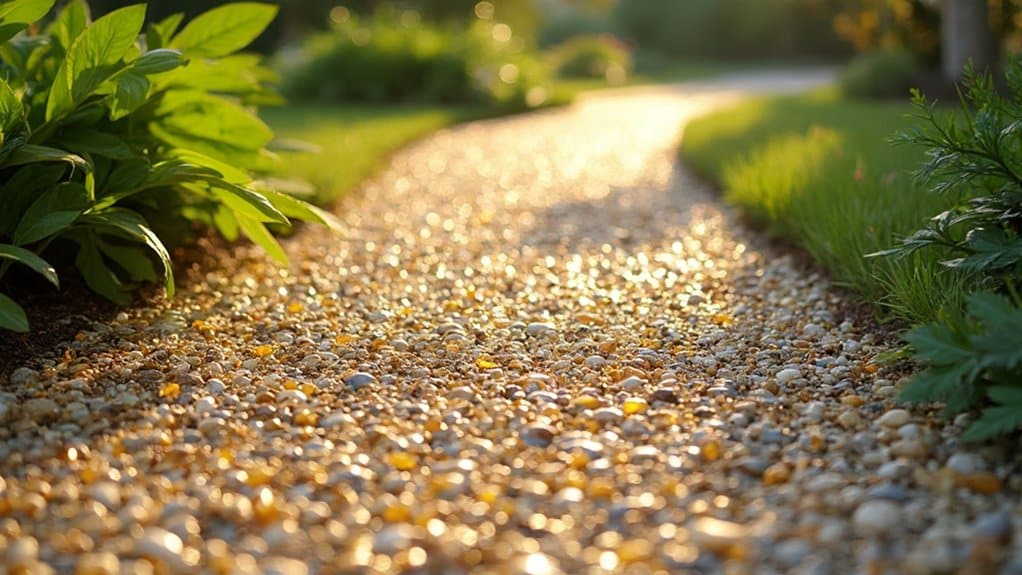Resin-bound gravel stands as Britain's premier surfacing choice, blending smart looks with practical benefits. Think of it as a tough outdoor carpet that handles everything from Manchester's rain to Cornwall's coastal weather. The surface lasts upwards of 20 years, making it ideal for driveways, garden paths and public spaces.
The porous surface means rainwater drains naturally, helping prevent those pesky puddles common with traditional paving. It's also low-maintenance – a quick sweep and occasional power wash keeps it looking sharp. With colour options ranging from Thames-grey to Yorkshire-stone, it suits any property style, from Victorian terraces to modern builds.
Environmentally sound and built to last, it's a worthwhile investment for any UK property owner seeking a reliable, good-looking surface solution.
Key Takeaways
Resin-bound gravel has become a top choice for British driveways and paths, offering both style and practicality. Think of mixing different coloured stones – from warm honey tones to sleek greys – to match your property perfectly.
Built to last, this surface handles everything from daily foot traffic to parked cars without fuss, and typically stays smart for over two decades. A quick sweep and occasional power wash is all it needs.
The surface performs brilliantly in our changeable British weather. It's grippy when wet, doesn't puddle thanks to its porous nature, and meets sustainable drainage standards – particularly helpful during those heavy downpours we're known for.
It's environmentally sound too. Using natural stone and eco-friendly resins, it helps manage rainwater better than concrete or tarmac, reducing local flood risks.
Little wonder it's becoming the go-to choice for modern British properties. From smart city homes to country estates, resin-bound gravel delivers both kerb appeal and genuine practicality.
The Visual Appeal of Resin-Bound Gravel
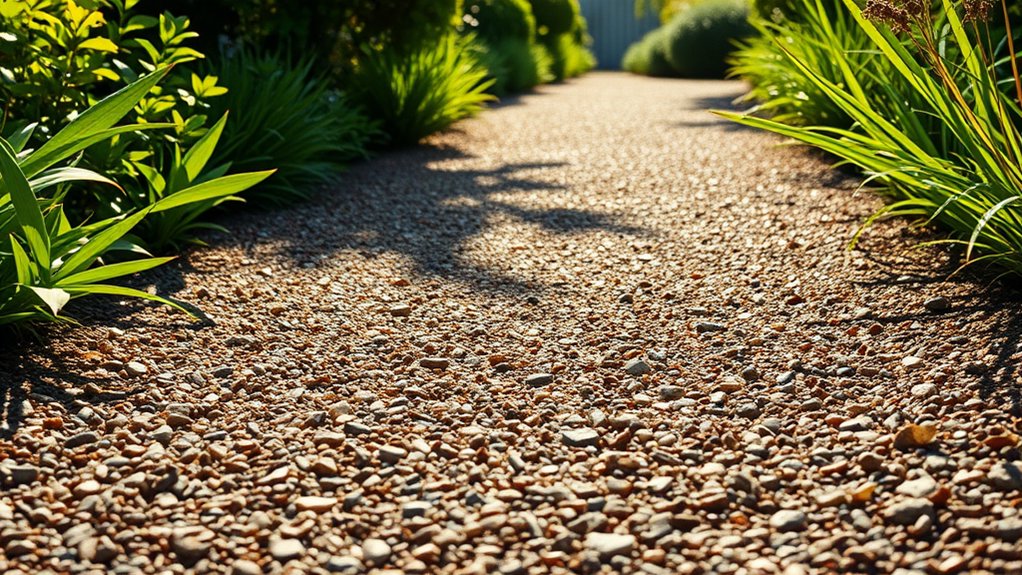
Resin-bound gravel offers striking visual appeal for outdoor spaces, combining practicality with modern style.
The blend of clear resin and natural stone aggregates creates a smooth, seamless finish that works brilliantly in British gardens and driveways. Colour options range from classic Cotswold stone beige to contemporary slate grey, letting you match your property's character perfectly. The material is also known for its durable, permeable pavement, ensuring both aesthetic and functional benefits. Additionally, the porous surface allows for effective drainage, preventing unsightly puddles and enhancing the overall look of your outdoor space.
Whether you're updating a Victorian townhouse in London or a modern home in Manchester, the material adapts to any setting. The finished surface looks particularly smart when used for garden paths or around water features, where its natural appearance complements existing landscaping.
With countless colour and aggregate combinations available, each installation can be uniquely tailored to suit your taste and property style.
Unmatched Durability and Longevity
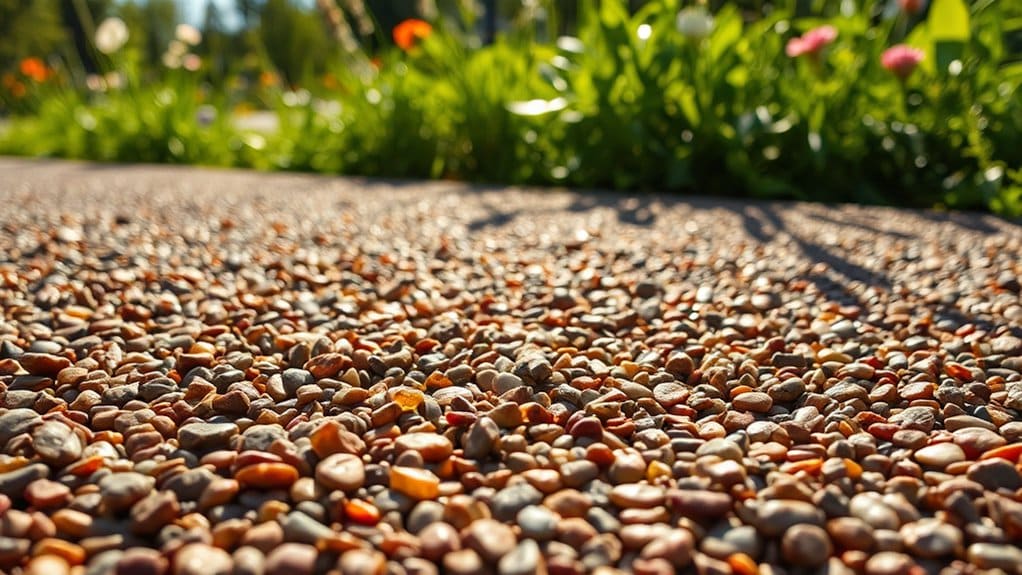
Resin-bound gravel delivers outstanding durability, handling both heavy footfall and regular vehicle movement without wearing down. Built to withstand British weather extremes – from summer heatwaves to winter frost – these surfaces maintain their integrity year-round. Such robust performance makes resin-bound surfacing an ideal choice for driveways, paths, and commercial spaces across the UK. With proper installation quality, these surfaces can last for decades, ensuring a long-lasting investment for any property. Expert base preparation and quality materials are crucial for achieving superior durability in resin-bound systems.
Exceptional Wear Resistance
Resin-bound gravel delivers outstanding durability, particularly in busy areas like car parks and driveways.
The mixture of resin and stone creates a robust surface that easily handles heavy vehicles and frequent foot traffic. Its seamless nature spreads weight evenly across the surface, preventing damage and weak spots from forming.
The textured finish offers excellent grip, even in typical British rainy weather, whilst the smooth appearance stays smart-looking for years. This surface is also capable of withstanding extreme cold temperatures, making it ideal for winter conditions. Additionally, proper installation is crucial for ensuring long-lasting performance and avoiding premature wear.
Unlike traditional gravel or concrete, it rarely cracks and needs little upkeep – just an occasional sweep and pressure wash.
It's particularly suited to home driveways, garden paths and shop fronts where you need a surface that's both practical and good-looking.
Weather-Resistant Features
The durability of resin-bound gravel goes well beyond basic wear protection, offering excellent weather resistance in British conditions. It stands up brilliantly to our heavy rainfall, winter snow and icy spells whilst keeping its structure and smooth finish. Quality resin ensures the surface lasts, with minimal wear and tear. Being SuDS compliant means proper water drainage, so you won't face issues with puddles or flooding.
| Feature | Benefit | Impact |
|---|---|---|
| Weather Resistance | Withstands British weather | Maintains surface integrity |
| Permeability | Effective drainage | Reduces flooding risks |
| Anti-Slip Properties | Enhanced grip | Increases safety |
| Temperature Resistance | Adapts to temperature changes | Prevents cracking |
| Longevity | Lasts 20-30 years | Low maintenance needs |
Customization Options for Every Style
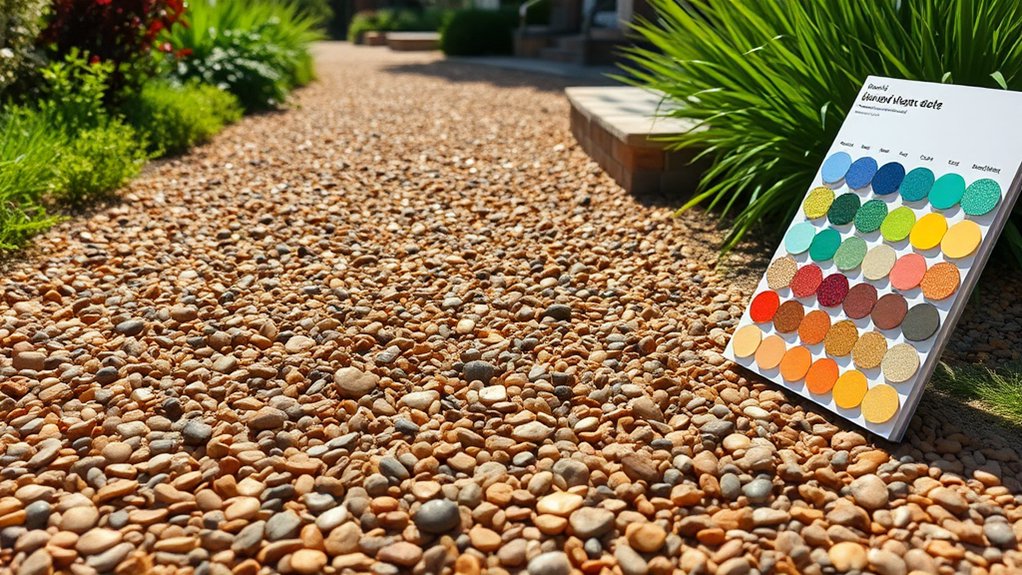
Resin-bound gravel offers extensive customisation options to match your style and surroundings.
The versatile nature of this surface means you can tailor it precisely to your needs:
- Colour Variations: Pick from bold or natural shades – think warm honey-coloured stone or classic grey blends that complement British gardens and driveways.
- Patterns and Designs: Add simple geometric shapes, curved borders, or even your family crest. Perfect for creating unique entrance ways or garden paths.
- Aggregate Choices: Select from different stones and materials like Cotswold limestone or recycled glass. Each choice brings its own character and practical benefits.
The flexibility of resin-bound surfaces lets you create exactly what you want, whilst maintaining durability and practicality for the British climate.
Low Maintenance and Upkeep Advantages

Maintaining outdoor surfaces needn't be a headache when you opt for resin-bound gravel.
The sealed finish keeps weeds at bay, and a simple sweep or power wash is all it takes to keep it looking smart.
Unlike traditional loose gravel that scatters across your drive or garden path, resin-bound surfaces stay firmly in place.
They shrug off oil stains brilliantly, and thanks to UV protection, the colour won't fade in the British sun.
The non-slip surface performs well in our wet weather, making it ideal for driveways, paths and patios.
At its core, resin-bound gravel is a fuss-free option that boosts both your property's practicality and value.
Environmental Benefits of Permeable Surfaces
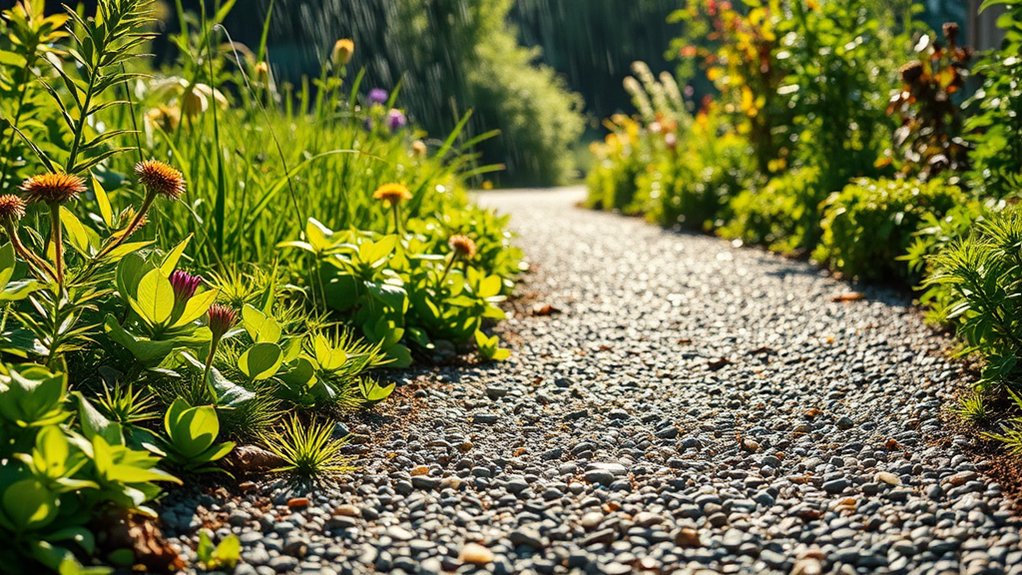
Permeable Surfaces: Environmental Benefits
Choosing permeable surfaces like resin-bound gravel offers significant environmental advantages for UK properties:
- Better Water Management: These surfaces soak up rainwater naturally, reducing surface flooding during heavy downpours – particularly useful for British weather conditions.
- Cleaner Water: As rain passes through the surface, pollutants from cars and garden chemicals get filtered out, protecting local streams and rivers.
- Temperature Control: Permeable surfaces help cool urban areas by allowing natural water evaporation, especially valuable during increasingly warm UK summers.
Installing permeable materials in driveways, paths and patios makes sound environmental sense.
Resin-bound gravel, which meets UK sustainable drainage regulations (SuDS), provides a practical solution for both residential and commercial spaces whilst supporting local ecosystem health.
Cost-Effectiveness and Installation Process
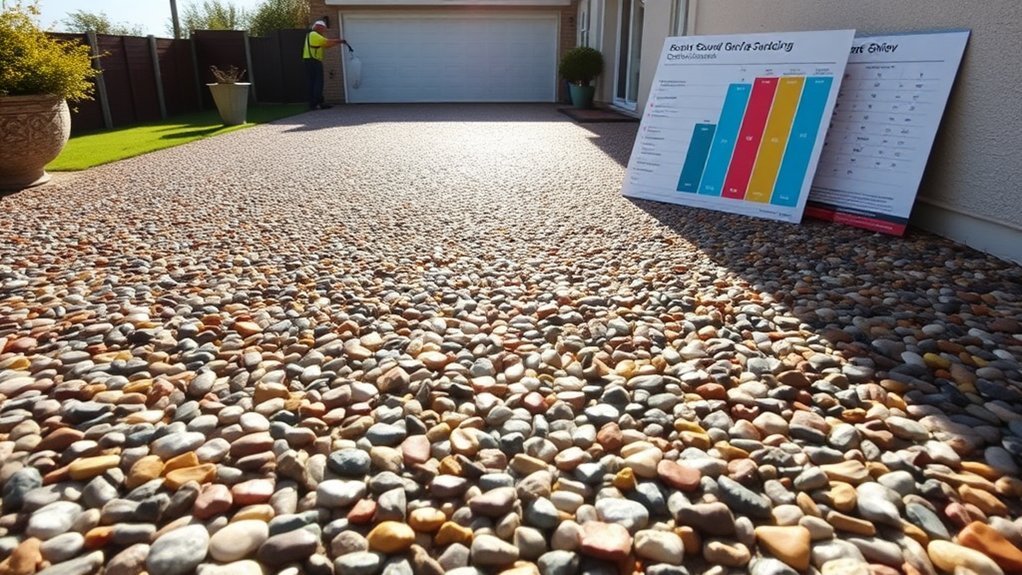
Cost-Effectiveness and Installation Process
Resin-bound gravel costs between £40 to £70 per square metre – pricier than standard block paving (£20-£105 per square metre).
Whilst the upfront cost is steeper, you'll save money long-term thanks to its durability and minimal upkeep needs – much like choosing a quality kitchen worktop that lasts for years.
The installation must be done by professionals and requires precise steps.
Your surface needs a solid foundation of compacted Type 1 Aggregate, laid 12-24mm deep depending on how you'll use it.
Think of it like laying tiles – the base must be spot-on for the best results.
The resin mixture gets trowelled until smooth and can go straight over existing asphalt or concrete, making the job quicker and cutting future maintenance costs.
Technical Specifications and Performance Factors
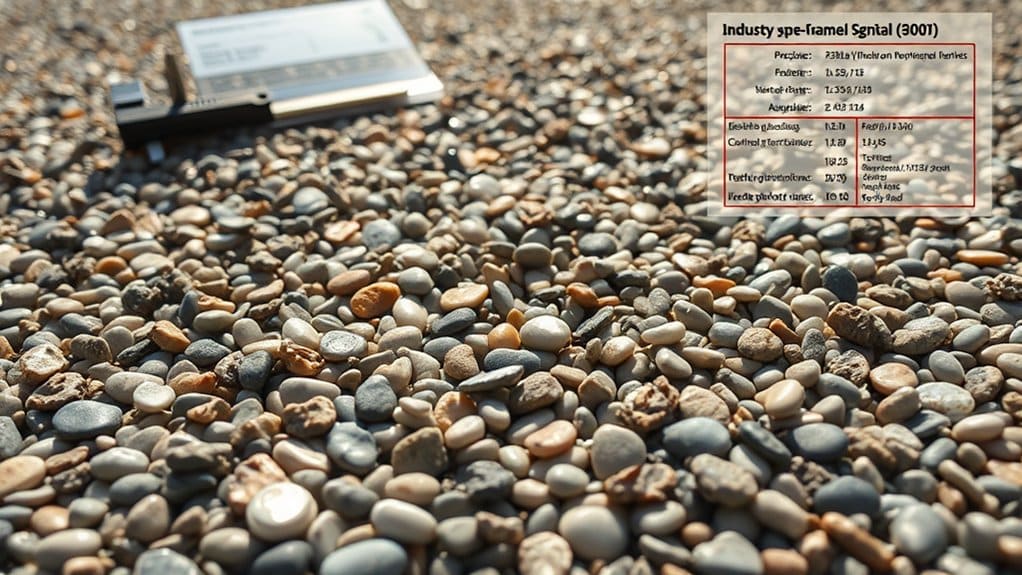
The durability and flexibility of resin-bound gravel make it ideal for UK driveways and paths, easily handling both vehicle weight and our varied weather conditions.
Your choice of stone mix affects both looks and strength – larger stones create a more rustic finish whilst smaller aggregates offer a smoother surface.
Think about where you'll use it: driveways need tougher mixes than garden paths, and coastal areas benefit from UV-resistant resins to prevent sun damage.
The right combination will give you a surface that looks good and lasts for years, even with our wet winters and occasional scorching summers.
Durability and Flexibility
Resin-bound gravel surfaces stand out for their durability and flexibility across UK homes and business properties.
Three essential durability aspects:
- Longevity: When fitted and maintained properly, these surfaces typically last beyond 20 years, showing better crack resistance than standard concrete.
- Environmental Resistance: The porous structure prevents water pooling and flooding – particularly useful for Britain's rainy climate – whilst keeping moss and algae at bay.
- Load-Bearing Capacity: Surface depth can be adjusted to handle different weights, from garden pathways to car parks, maintaining structural strength throughout.
The robust nature of resin-bound gravel pairs with design versatility, offering countless colour combinations and patterns to match any property style.
Aggregate Composition and Types
The strength and flexibility of resin-bound gravel relies on its aggregate mix and types. Natural aggregate, stone or recycled glass boost both looks and longevity. Standard aggregate sizes of 1-3mm or 2-5mm provide the right balance of drainage and durability for most uses. For best results, mix one part resin with 13 parts aggregate.
| Aggregate Types | Mix Ratios |
|---|---|
| Natural Aggregate | 1:13 |
| Stone | 1:13 |
| Recycled Glass | 1:13 |
Using quality materials and following these ratios will create a sturdy surface that handles both foot traffic and vehicles whilst looking smart.
Environmental Resistance Factors
Environmental Resistance Factors
When installing a resin-bound gravel surface, you'll need to consider key environmental factors that affect its long-term performance. These elements ensure the surface remains durable whilst meeting UK sustainability standards.
- Weather Resistance: British weather poses no issue – resin-bound surfaces cope well with our heavy rainfall and temperature swings, much like those found in coastal areas like Brighton or wet regions like Manchester.
- SUDS Compliance: The surface meets UK Sustainable Urban Drainage Systems requirements, working like a natural filter. Think of it as a giant sponge that helps prevent the local flooding we often see with traditional paving.
- Eco-Friendly Materials: The materials used have minimal environmental impact, and the permeable surface allows rainwater to naturally seep into the ground, much as it would on a grass lawn.
Market Trends Driving Popularity
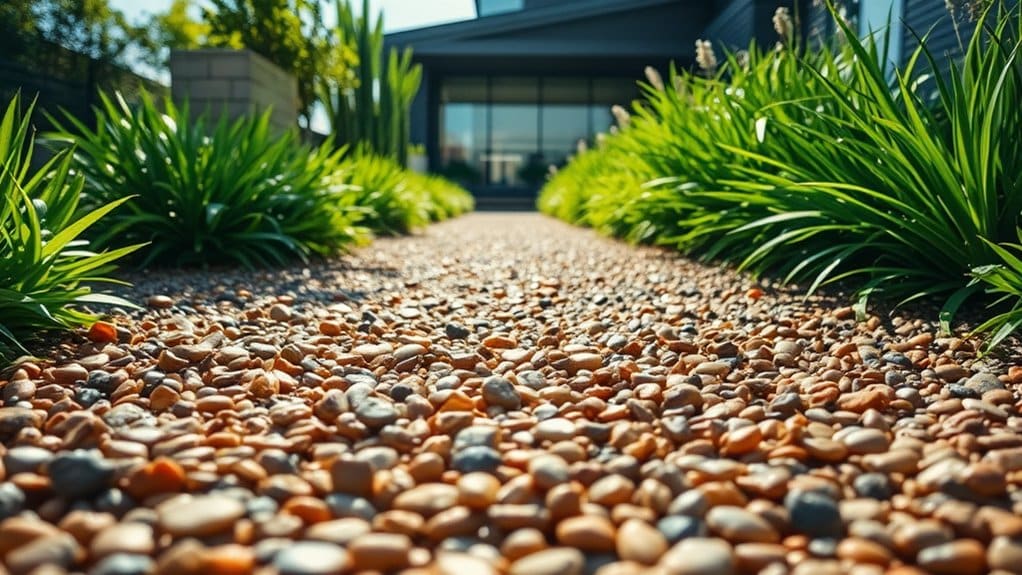
The construction sector is seeing a marked rise in resin-bound gravel's popularity as a top surfacing choice. Property owners across Britain increasingly favour this material for its blend of practicality and visual appeal. The system offers extensive colour options that complement everything from period homes to modern builds.
Notably, resin-bound surfaces prove their worth in the British climate, handling both heavy rain and frost while providing reliable drainage. This feature makes them particularly valuable for driveways and garden paths, where standing water often poses problems. The material meets UK planning requirements for sustainable drainage systems (SuDS), a key consideration for new builds and renovations.
Though initially pricier than traditional gravel or concrete, resin-bound surfaces typically prove cost-effective over time, needing minimal maintenance and retaining their appearance for years.
This durability, combined with environmental benefits, explains why both homeowners and commercial developers increasingly choose this surfacing option.
Maintenance Practices for Long-Term Use
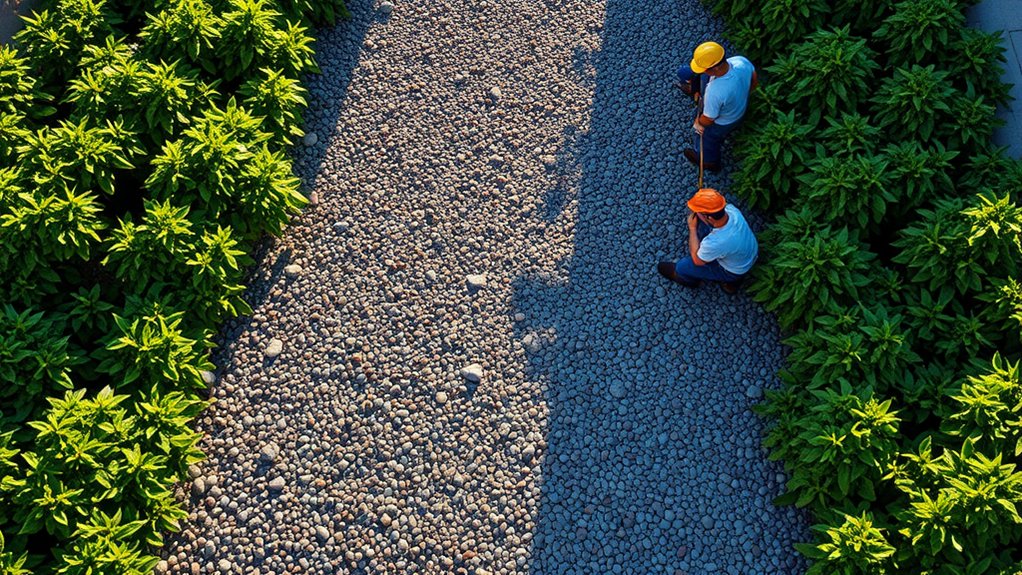
Maintaining Your Resin-Bound Gravel Surface
Three essential maintenance practices:
1. Regular Cleaning: Sweep away leaves and litter regularly, with a thorough pressure wash once or twice yearly.
For deeper cleans, stick to mild detergents – harsh chemicals like bleach will damage the resin.
2. Stain Removal: Deal with spills straight away.
Use a de-greaser for engine oil, just like you'd on your driveway. For fuel spills, warm, soapy water does the trick.
Remove bird mess and tree sap quickly to avoid staining.
3. Managing Organic Growth: Regular sweeping keeps moss and algae at bay, particularly important during damp British winters.
If you need a herbicide, choose carefully and test on a small area first.
Check your surface monthly for any issues – catching problems early saves hassle later.
Frequently Asked Questions
How Long Does the Installation Process Typically Take?
Installation times vary between several hours and a few days. The exact duration depends largely on British weather conditions, how much ground preparation is needed, and required curing times. A basic driveway installation might take a day, whilst more complex projects with decorative features could stretch to 2-3 days.
Can Resin-Bound Gravel Be Installed in Cold Weather?
Resin-bound gravel installation is possible in cold weather, but proper temperature control is crucial for successful curing. Think of it like setting a cake – you need the right conditions for it to set properly. For best results, maintain the surface temperature above 5°C during installation and the initial curing period (typically 24 hours). A gazebo or temporary shelter with heating can help achieve these conditions on chilly British winter days.
Is Resin-Bound Gravel Suitable for Commercial Properties?
Resin-bound gravel proves ideal for commercial spaces across the UK. Its hard-wearing nature handles heavy foot traffic brilliantly, whether for office car parks, shopping centres or hotel driveways. The surface stays smart with minimal upkeep, saving businesses precious maintenance costs. Plus, its non-slip qualities meet safety requirements, whilst looking far smarter than traditional tarmac or concrete.
What Colors and Textures Are Available for Customization?
Colour and texture options are extensive, offering everything from sleek, glossy finishes to rustic, textured surfaces. Choose from classic neutrals, bold contemporary shades, or natural tones like sandstone and slate. Popular finishes include matte, high-gloss and grainy textures, letting you match your existing décor or create striking contrasts.
How Does Resin-Bound Gravel Compare to Traditional Paving Materials?
Resin-bound gravel offers distinct advantages over traditional paving like concrete or tarmac. It's remarkably durable, with minimal cracking even in harsh British weather. The finish comes in various colours and patterns to suit any property style, from modern flats to period homes. Whilst the initial cost may be higher than standard paving, its low-maintenance nature and long lifespan make it a cost-effective choice for driveways and garden paths.
Conclusion
Resin-bound gravel stands as a practical choice for UK properties, combining kerb appeal with genuine value. Think garden paths that stay pristine through British winters or driveways that shrug off heavy rain without puddles. Its permeable surface ticks the box for sustainable drainage, whilst requiring minimal upkeep – just an occasional sweep and wash. The initial investment pays off through durability and increased property value. With more homeowners and councils choosing resin-bound surfaces, it's proven itself as more than a passing trend in British landscaping.
